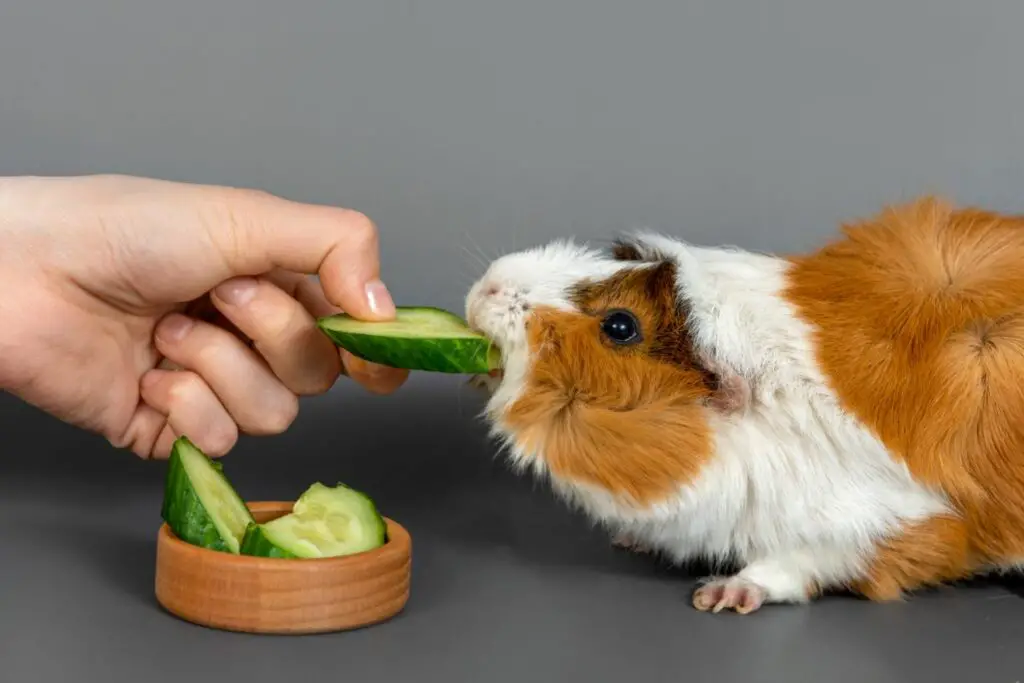Are you a new guinea pig owner or just looking for ways to improve your pet’s diet? Well, look no further! This blog post will cover everything you need to know about a guinea pig’s favorite food. We’ll cover a variety of fruits, vegetables, hay, and pellets to give you an idea what kinds of food get a big thumbs up from guinea pigs.
In addition, we’ll also discuss what they should avoid, and how much and how often to feed them.

What is a Guinea Pig’s Diet?
Guinea pigs are herbivores, so their diet should consist of mainly hay, vegetables, and fruit. Pellets can also be added for additional nutrients, but they should not be the primary source of food.
Hay – The Foundation of a Guinea Pig’s Diet
Hay is the foundation of a guinea pig’s diet, and it should always be available to them. Hay provides essential fiber that aids in digestion and keeps their teeth healthy. Timothy hay, orchard grass hay, and meadow hay are the most popular types of hay for guinea pigs.
Vegetables – A Variety of Essential Nutrients
Vegetables are an essential part of a guinea pig’s diet because they provide a variety of nutrients. Some of the best vegetables for guinea pigs include leafy greens, such as romaine lettuce, kale, and spinach, as well as bell peppers, cucumbers, and carrots.
Fruits – The Perfect Treat for Your Guinea Pig
Fruits are a perfect treat for your guinea pig, but they should be given in moderation because of their high sugar content. Some of the best fruits for guinea pigs include apples, strawberries, and blueberries.
Pellets – A Convenient Source of Nutrition
Pellets can be a convenient source of nutrition for guinea pigs, but they should not be the primary source of food. Pellets should be high in fiber and Vitamin C, which is essential for guinea pig health.
What are the Best Foods For Guinea Pigs?
The Top 10 Best Vegetables for Guinea Pigs
- Romaine lettuce
- Spinach
- Kale
- Carrots
- Bell peppers
- Cucumbers
- Parsley
- Broccoli
- Tomatoes
- Celery
The Top 5 Best Fruits for Guinea Pigs
- Apples
- Strawberries
- Blueberries
- Raspberries
- Watermelon
The Top 3 Best Hay Types for Guinea Pigs
- Timothy hay
- Orchard grass hay
- Meadow hay
The Top 3 Best Pellets for Guinea Pigs
- Oxbow Cavy Cuisine Adult Guinea Pig Pellets
- Small Pet Select Guinea Pig Food Pellets
- Mazuri Timothy-Based Guinea Pig Diet Pellets
What Foods Should You Avoid Feeding Your Guinea Pig?
List of Foods That Are Toxic for Guinea Pigs
- Avocado
- Chocolate
- Onions and garlic
- Potatoes
- Rhubarb
- Tomato leaves and stems
- Seeds and pits (apple seeds, cherry pits, etc.)
- Dairy products
How Much and How Often Should You Feed Your Guinea Pig?
A guinea pig should have access to hay at all times, and they should be given fresh vegetables and fruit daily. Pellets should be given in moderation, and the amount depends on the age and weight of your guinea pig. A good rule of thumb is to give 1/8 to 1/4 cup of pellets per day.
Other Feeding Tips and Tricks for Guinea Pig Owners
Provide Fresh Water at All Times
Guinea pigs should always have access to fresh, clean water. Make sure to check their water bottle daily and refill it as needed.
Introduce New Foods Gradually
When introducing new foods to your guinea pig, do it gradually to avoid upsetting their stomach. Give them a small piece of the new food and wait to see if they have any adverse reactions.
Feeding During Pregnancy and Nursing
Pregnant and nursing guinea pigs require more food than usual. Make sure to provide them with extra hay and pellets, as well as a variety of fresh vegetables and fruit.
Conclusion
In conclusion, a guinea pig’s diet should consist of mainly hay, vegetables, and fruit, with pellets added in moderation. Always provide fresh water, and avoid feeding them foods that are toxic to their health. By following these guidelines and feeding your guinea pig a balanced diet, you can ensure that your pet is happy and healthy for years to come.
- How Long Do American Eskimo Dogs Live? Important Factors and Care Tips - September 29, 2023
- Do American Bulldogs Need Grooming? Essential Tips and Care Guidelines - September 29, 2023
- Do Bengal Cats Enjoy Playing? Essential Tips for Keeping Them Active - September 29, 2023